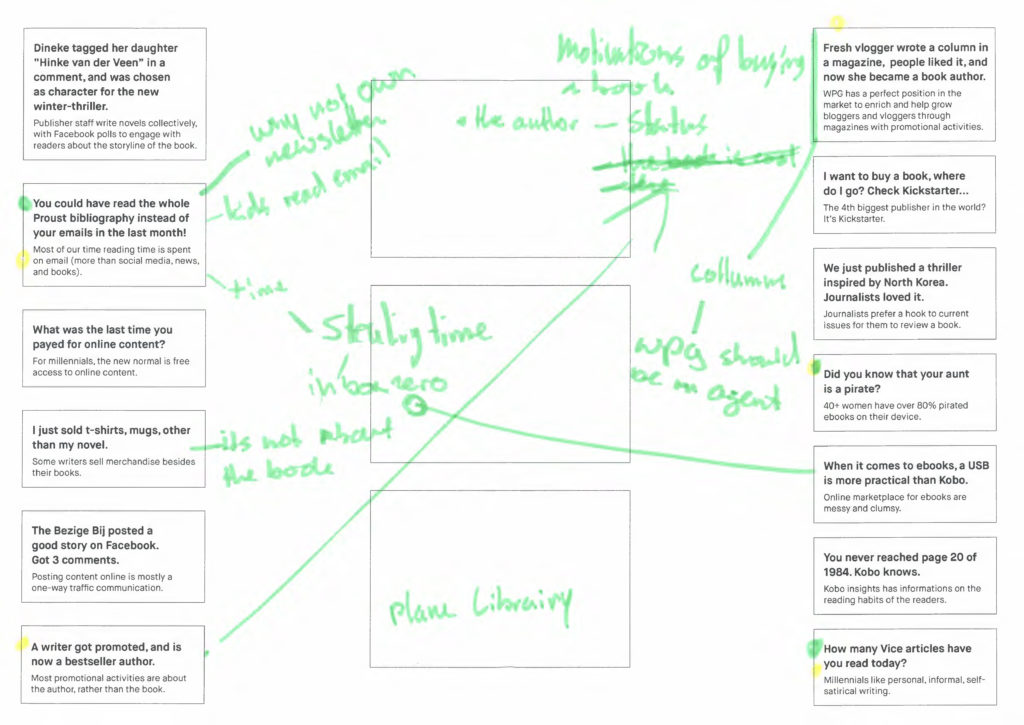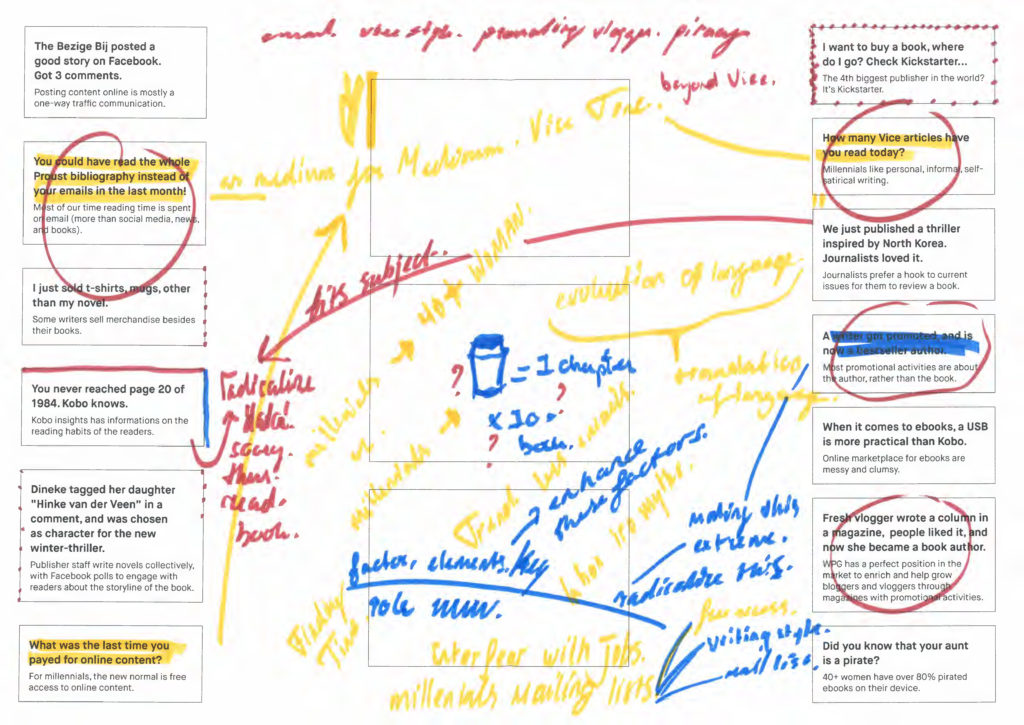The briefing that we received before the first meeting with WPG put the focus of the project on the ‘development of new ways of reading’ and how we could enhance the experience of the reader and thus bring more attention to a new publication.
During the first meeting, we met Head Innovation & Development, Laurens Massee and Business Development Manager, Michiel Verhaar. They are both our contacts from WPG Uitgevers and we will be working with them throughout the project. They showed us previous and existing ideas and products that have to do with the experience of the reader. Together we constructed a better understanding of the goals of the project and set goals for the upcoming sprints and meetings.
Sprint 1 gave us the space to get acquainted with the habits, methods and internal processes of WPG as well as different publishing houses, such as the Bezige Bij and AW Bruna. We carried on the research by producing a series of interviews and reading through documentation and reports about the publishing industry as a whole.
We interviewed the former Head of ePublishing and current Innovation Lead (Gwena Jaouen), the Head of Publicity and Promotion at the Bezige Bij (Charlotte Huizink) and the Publisher Non-fiction at AW Bruna (Joost van den Ossenblok). Research reports and yearly reviews are written by corporations such as PricewaterhouseCoopers, Nielsen, Screenforce, MediaTijd, WPG Boekenupdate, and GfK. The research created a view on the current state of affairs in the publishing world. Based on this research we formulated the following two statements.
People don’t read much. Millennials rarely finish their books and publishing houses don’t really know how to reach them. But at the same time piracy for online publishing is big: books are downloaded, shared and copied.
Unfortunately, print sales are falling. At the same time, the expected growth of ebook sales is not really happening. It’s hard and expensive to understand customers behaviors, interest and needs therefore they are unable to evaluate the books besides their sales. Furthermore, the book publishing industry is quite conservative as publishers struggle to try out new models.
Interview with Gwena Jaouen
Since we wanted to know more about WPG’s ebooks, Michiel quickly asked Gwena Jaouen to join us. She used to be responsible for digital books sales and marketing at AW Bruna and was the product owner of the “Lees dit boek” platform. Based on the interview and answers, we constructed the following statement.
WPG does not reach the audience directly and sufficiently. Currently downloading illegal e-books is pretty easy and a wide-spread plague for the Dutch e-book market. Book publishing is a conservative market. 40+ women are the biggest target audience of book readers. The e-book revenues in the USA and the UK are far higher than in The Netherlands (we are stuck at approx. 6% of the total revenue).
Interview with Charlotte Huizink
Our second interview was with Charlotte Huizink. The Bezige Bij is the literature division of WPG and is one of the most relevant (translated, fiction and nonfiction) literary publishers in The Netherlands and Vlaanderen. The Bezige Bij has a broad scope as they publish works by Harry Mulisch, Peter Buwalda, and Hugo Claus. Based on the talk with Charlotte and her answers, we wrote the following statement.
The Bezige Bij has a big challenge ahead; over the last few years the book market has decreased in size, which has put strain on the whole industry. Charlotte told us that because of the established revenue models in the industry, getting to know the readers and having a direct interaction with them is a big challenge. Knowing who the reader is, who reads which genre, and which communication channels they respond to, will help book publishers to connect with their customers.
Interview with Joost van den Ossenblok
Our third interview was with Joost van den Ossenblok. He manages one of the three major lists of A.W. Bruna: the non-fiction. He is responsible for which books get published. The list is divided into three imprints: Lev (titles about personal development), VIP (celebrity biographies) and 24Kitchen (cookery).
Joost mentioned the series of novels by Suzanne Vermeer. The series was started by Paul Goeken, writing under the name Suzanne Vermeer. Since the author’s death, the series was continued under the same name. Each year, in Summer and Winter, we publish two novels that are set in popular holiday destinations. Over time the interactivity with the readers increased e.g. through the social media community. Readers are now asked to express their opinion about covers and they can vote on polls about the location where the new novel should be set.
For non-fiction it’s easier to find the hook to sell the book. Because there is usually no direct contact between publishing house and book buyers, it’s harder to know who the actual target audience is. Future could bring new social changes between author and publisher, as some writers sell their own books together with other products and writing simply isn’t their main source of income. Surprisingly most promotional activities are about promoting the author, rather than the book.
During the research we documented intersting ideas, concepts, and findings. At the end of sprint 1 we analysed our findings, whereafter we selected the most relevant and interesting findings and reformulated those ideas into bold statements enforced by the insights.
When was the last time you payed for online content?
For millennials, the new normal is free access to online content.
How many Vice articles have you read today?
Millennials like personal, informal, self-satirical writing.
You could have read the whole Proust bibliography instead of your emails in the last month!
Most of our reading time is spent on email (more than social media, news, and books).
Did you know that your aunt is a pirate?
40+ women have over 80% pirated ebooks on their device.
When it comes to ebooks, a USB is more practical than Kobo.
Online marketplace for ebooks are messy and clumsy.
You never reached page 20 of 1984.
Kobo knows.
Kobo insights has informations on the reading habits of the readers.
I want to buy a book, where do I go?
Check Kickstarter…
The 4th biggest publisher in the world? It’s Kickstarter.
The Bezige Bij posted a good story on Facebook. Got 3 comments.
It is hard to activate a two-way communication on social media.
We just published a thriller inspired by North Korea. Journalists loved it.
Journalists prefer a hook to current issues for them to review a book.
Dineke tagged her daughter “Hinke van der Veen” in a comment, and was chosen as character for the new winter-thriller.
Publishers’ staff writes a novel collectively, using Facebook polls to engage with the reader about the storyline of the book.
Today I sold t-shirts, mugs, and no copies of my novel.
Some writers sell merchandise besides their books.
A writer got promoted, and is now a bestseller author.
Most of the promotional activities are about the author, rather than the book.
Fresh vlogger wrote a column in a magazine, people liked it, and now she became a book author.
WPG has a perfect position in the market to enrich and help grow bloggers and vloggers through magazines with promotional activities.
Presentation meeting
At the end of sprint 1 we presented the findings of our research and collectively discussed and brainstormed about how these could function in potential project directions. Together we decided that for the upcoming sprint we narrow the research down to the following four findings;


- We spend most of our reading time on reading email (reading books holds the 4th place).
- ‘Millennials’ are attracted to specific writing styles that are personal, informal and self-satirical. Also prefer free access to online content.
- Most promotional activities focus on promoting the author, whereafter the books follows.
- WPG is situated perfectly in the market as potential ‘agent’ to provide bloggers and vloggers with opportunities for growth.
Plans for next sprint
Upcoming sprint aims to specify and expand the research and exploring of these four individual findings. By combining findings and formulating multiple hypotheses, we narrow down the research into specific research directions. We plan to achieve this through viewing and gathering cases of these findings that are significant, successful or unsuccessful in researching the key-factors of their process and trying to evaluate our hypotheses.


